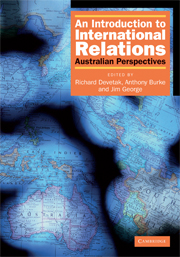Book contents
- Frontmatter
- Contents
- List of tables, figures and boxes
- List of contributors
- Preface and acknowledgments
- An introduction to international relations: the origins and changing agendas of a discipline
- 1 Theory and practice in Australian international relations: the search for identity and security
- Part 1 Theories of international relations
- Part 2 The traditional agenda: states, war and law
- Part 3 The new agenda: globalisation and global governance
- Glossary of terms
- Bibliography
- Index
- References
An introduction to international relations: the origins and changing agendas of a discipline
- Frontmatter
- Contents
- List of tables, figures and boxes
- List of contributors
- Preface and acknowledgments
- An introduction to international relations: the origins and changing agendas of a discipline
- 1 Theory and practice in Australian international relations: the search for identity and security
- Part 1 Theories of international relations
- Part 2 The traditional agenda: states, war and law
- Part 3 The new agenda: globalisation and global governance
- Glossary of terms
- Bibliography
- Index
- References
Summary
This Introduction begins by first outlining what is meant by international relations. Second, it tells the story of how and why the study of international relations emerged when it did in the early twentieth century. Knowing something about the discipline's origins does not tell us everything we need to know about international relations today, but it will help us to understand the legacy left by the discipline's original purpose and by older traditions of thought. Third, it sketches the contours of the changing agenda of international relations, a shift that some scholars describe as a transition from international relations to world politics or from the ‘traditional’ to the ‘new’ agenda. Although there can be little doubt that as political reality has changed, new theoretical and conceptual tools have become necessary, we should not assume that a complete break with the past has rendered the ‘traditional’ agenda and its theories obsolete. Far from it; the ‘new’ agenda, as we shall see, supplements but does not supplant the ‘traditional’ agenda. It is now more important than ever to think about the relationship between ‘traditional’ and ‘new’ theories and issues.
What is international relations?
Every day the global news media carry stories of events involving foreign governments and their populations. Usually featured under the heading of ‘international affairs’ or ‘world news’, these stories all too frequently tell of political violence, lives and livelihoods lost, human rights violated, infrastructure damaged, and hopes for the restoration of peace and prosperity dashed.
- Type
- Chapter
- Information
- An Introduction to International RelationsAustralian Perspectives, pp. 1 - 16Publisher: Cambridge University PressPrint publication year: 2007
References
- 1
- Cited by

